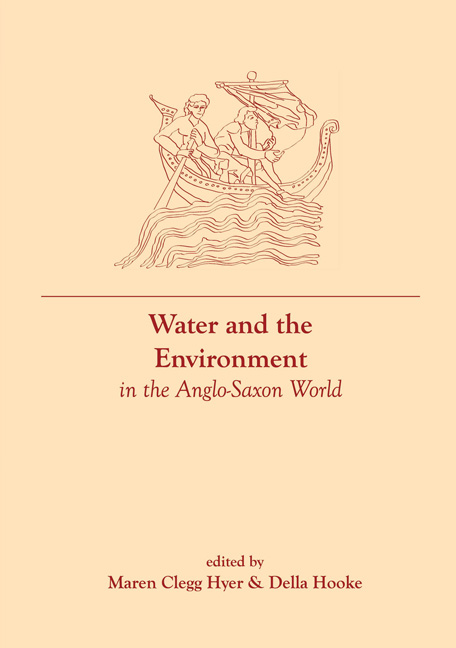Book contents
- Frontmatter
- Dedication
- Contents
- List of Illustrations
- List of Tables
- List of Contributors
- Introduction
- 1 From Whale's Road to Water under the Earth: Water in Anglo-Saxon Poetry
- 2 Water in the Landscape: Charters, Laws and Place Names
- 3 Fens and Frontiers
- 4 Marshlands and Other Wetlands
- 5 Rivers, Wells and Springs in Anglo-Saxon England: Water in Sacred and Mystical Contexts
- 6 Food from the Water: Fishing
- 7 Inland Waterways and Coastal Transport: Landing Places, Canals and Bridges
- 8 Watermills and Waterwheels
- 9 Water, Wics and Burhs
- Notes
- Suggested Reading
- Index
3 - Fens and Frontiers
- Frontmatter
- Dedication
- Contents
- List of Illustrations
- List of Tables
- List of Contributors
- Introduction
- 1 From Whale's Road to Water under the Earth: Water in Anglo-Saxon Poetry
- 2 Water in the Landscape: Charters, Laws and Place Names
- 3 Fens and Frontiers
- 4 Marshlands and Other Wetlands
- 5 Rivers, Wells and Springs in Anglo-Saxon England: Water in Sacred and Mystical Contexts
- 6 Food from the Water: Fishing
- 7 Inland Waterways and Coastal Transport: Landing Places, Canals and Bridges
- 8 Watermills and Waterwheels
- 9 Water, Wics and Burhs
- Notes
- Suggested Reading
- Index
Summary
[The Peterborough fen] is very valuable to men because there are obtained in abundance all things needful for them that dwell nearby, logs and stubble for kindling, hay for the feeding of their beasts, thatch for the roofing of their houses, and many other things of use and profit, and moreover it is very full of fish and fowl. There are divers rivers and many other waters there, and moreover great fishponds. In all these things the district is very rich. (Hugh Candidus, The Peterborough Chronicle 5, mid-twelfth century)
Introduction
A word for ‘frontier’ did not exist in Old English; writing on fens and frontiers therefore poses a challenge. The nuances of the modern term can be quite wide-ranging: we use it for everything from a place such as America's Wild West to space exploration to finding new treatments on the frontiers of medical research. Here we look at Anglo-Saxon frontiers as both literal and figurative, material and imagined. This approach yields somewhat divergent evidence that suggests settlement of the fens could, on a practical level, increasingly exploit the rich material yields of the environment, seen partly through archaeology and place name study, while, simultaneously, the concept of the fens could evoke layers of interpretation, superstition and belief that grew and evolved in the imagination according to cultural needs and ideologies. Considering how and why fens matter in Anglo-Saxon culture allows an exploration of the impact of fens on the thoughts and perceptions of Anglo-Saxons, showing something of how this particular land- and waterscape shaped its peoples.
In an earlier article, ‘Living on the Ecg’, I attempted to get at habits of mind among the Anglo-Saxons by looking at texts alongside the environmental and archaeological evidence for the interplay of land and water:
The mutability of the ‘edge’ between land and water, as recorded in Anglo-Saxon texts and archaeology, fits with a way of thinking that considered land/water intersections as a habit of perception or vision, coloring and marking more than the physical environment … creating something of a cognitive map for how vision translates into thought and perception, and how the physical environment can reveal conceptual boundaries.
- Type
- Chapter
- Information
- Water and the Environment in the Anglo-Saxon World , pp. 68 - 88Publisher: Liverpool University PressPrint publication year: 2017



